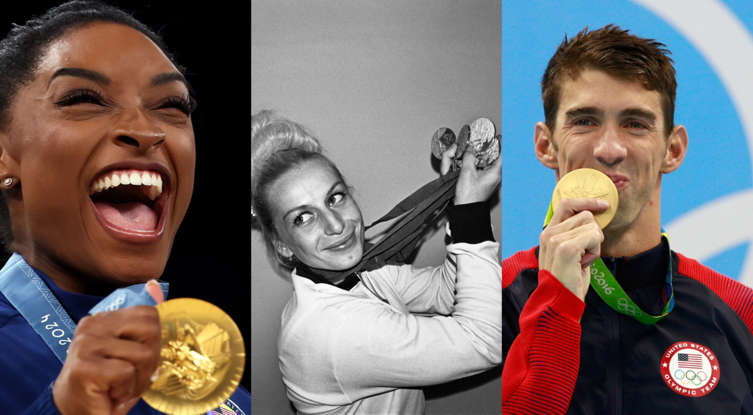Most Decorated Athletes: Who Tops the Medal List?

When it comes to the grandeur of sports, the discussion often turns to those athletes who have not only excelled but have dominated their disciplines, leaving an indelible mark on the history of competitive sports. Across various fields, from Olympic games to World Championships, certain individuals have achieved what many can only dream of: becoming the most decorated athletes in history. This blog post explores who these incredible athletes are, their achievements, and what made their journeys so extraordinary.
Defining Success in Sports

Success in sports is often quantified by the number of medals or titles won, but there's more to it. Consideration must be given to:
- Consistency: Repeatedly performing at the highest level over a long period.
- Versatility: Winning across different events or sports.
- Impact: How their achievements influenced the sports world.
The Legends

Here are some of the most decorated athletes:
Michael Phelps


Michael Phelps, with his iconic 'wings' underwater, is synonymous with Olympic success. Known as the "Baltimore Bullet," Phelps' career spans:
- 28 Olympic medals: 23 gold, 3 silver, and 2 bronze.
- He holds numerous world records and was part of the U.S. team that broke the record for the highest medal count in a single Olympics.
Larisa Latynina

In the realm of gymnastics, Larisa Latynina from the Soviet Union stands out:
- 18 Olympic medals: 9 gold, 5 silver, and 4 bronze.
- Her reign in the 1956, 1960, and 1964 Olympics marked her as one of the greatest of all time.
Marit Bjørgen

Marit Bjørgen from Norway dominates cross-country skiing with:
- 15 Winter Olympic medals: 8 gold, 4 silver, and 3 bronze.
- Her accolades also include numerous World Championships and Tour de Ski titles.
Paavo Nurmi

Known as the "Flying Finn," Paavo Nurmi was a middle- and long-distance runner:
- 9 Olympic gold medals in the 1920s.
- His revolutionary training methods set the standard for future athletes.
Usain Bolt

The fastest man on earth, Usain Bolt, has:
- 8 Olympic gold medals: In sprinting, he has achieved the unparalleled 'triple triple', winning the 100m, 200m, and 4x100m relay in three consecutive Olympics.
The Metrics of Greatness

How does one measure greatness in the world of sports?
- Medal Count: The number of medals or trophies won.
- Records: World records, Olympic records, etc.
- Longevity: Career span with consistent high-level performance.
- Influence: Changing the sport's standards, technique, or culture.
📌 Note: When comparing athletes from different sports and eras, these criteria help in forming a nuanced view of their contributions.
The Table of Greats

| Athlete | Sport | Medals | Era | Country |
|---|---|---|---|---|
| Michael Phelps | Swimming | 28 | 2000 - 2016 | USA |
| Larisa Latynina | Gymnastics | 18 | 1956 - 1964 | Soviet Union |
| Marit Bjørgen | Cross-Country Skiing | 15 | 2002 - 2018 | Norway |
| Paavo Nurmi | Athletics | 9 | 1920 - 1928 | Finland |
| Usain Bolt | Athletics | 8 | 2008 - 2016 | Jamaica |

Endurance, Technique, and Passion

The common thread among these athletes is not just their medals, but their endurance, technical proficiency, and sheer passion for their sport. Here's a closer look at what made them stand out:
- Endurance: The ability to maintain top form over multiple Olympic cycles.
- Technique: Pioneering or perfecting their sport’s techniques.
- Passion: A love for their sport that fueled their training and performances.
📝 Note: These elements combined can often differentiate good athletes from the greats.
Evolution of Sports and Training

The evolution in sports science, training methodologies, and athlete nutrition has undoubtedly contributed to the rise of these legends:
- Technology: Advances in equipment, analysis, and recovery techniques.
- Scientific Approach: Sport-specific training, biomechanics, and personalized fitness regimes.
The Impact on Future Generations

The legacy of these athletes goes beyond medals:
- Inspiration: They serve as motivation for upcoming athletes.
- Standards: Their performances set benchmarks for future competitors.
- Influence: Their achievements change how sports are viewed and approached.
Conclusion

In the panorama of sports, the stories of these individuals remind us that greatness is not just about medals, but the journey, the dedication, and the impact. From Michael Phelps’ unparalleled swimming achievements to Marit Bjørgen's dominance in cross-country skiing, each athlete brings a unique narrative of determination and excellence. Their records and accolades tell stories of human endurance, passion, and the spirit of competition that continues to inspire athletes and fans alike. In summarizing these key points, one understands that true greatness in sports is a multifaceted tapestry, woven from moments of triumph, innovation, and the relentless pursuit of excellence.
Who is considered the greatest Olympic athlete of all time?

+
Michael Phelps is often considered the greatest Olympic athlete due to his unmatched record of 28 Olympic medals, with 23 of them being gold.
How do you compare athletes from different sports?

+
Comparisons are made based on criteria like medal count, influence on the sport, longevity, world records, and the athlete’s dominance within their field.
What role does technology play in modern athletic achievements?

+
Technology has significantly impacted sports through improved training techniques, equipment, and analysis, enabling athletes to perform at peak levels and achieve new records.
Are Olympic medals the only measure of an athlete’s greatness?

+
No, while medals are a significant indicator, other factors like consistency, innovation in training, influence on sport, and public impact are equally important in defining an athlete’s greatness.
How have training methods evolved over time?

+
Training methods have shifted from general fitness to sport-specific and personalized training regimes, incorporating advanced biomechanics, nutrition, and recovery techniques.



